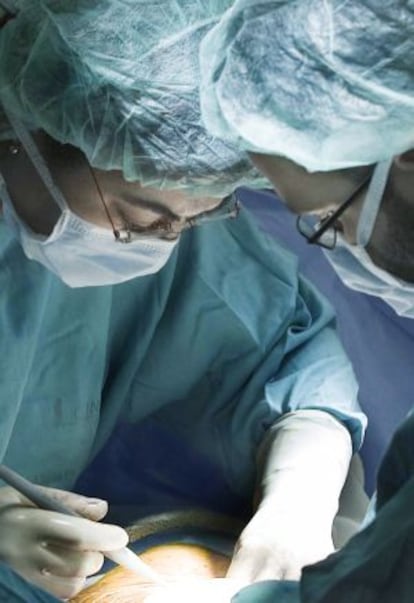Lebanese politician’s son claims they never offered money to organ donors
Family of Hatem Akouche says his arrest is the result of a misunderstanding

Ali Hatem Akouche pulls out all the paperwork proving that he was a perfectly legal donor of the liver section that saved his father from a life-threatening cancer.
Ali is the eldest son of Hatem Akouche, 61, a Lebanese politician who was arrested in Madrid as part of a police raid against a ring that allegedly purchased vital organs from undocumented migrants. This is the first case of organ trafficking to see the light in Spain, a country with a high donation rate and where buying and selling organs is a crime.
The politician’s son says he knows nothing about money offered for donations, or about secret tests to determine the compatibility of poor immigrants’ organs with his father’s own. He does, however, admit that during the time the two of them were in Valencia and Barcelona, they contemplated other options for the surgery.
“Some people offered to help us; my father did not know them, but I did,” he says, speaking inside the family home in Kharayeb, a town in southern Lebanon where his father is the mayor.
Hatem Akouche was arrested in January at Manises airport (Valencia). Days later, the police detained four other people – three Lebanese relatives and their Palestinian contact – as a result of an investigation that began more than a year earlier, when an NGO alerted authorities that several people were offering 40,000 euros in exchange for liver sections.
Criminal investigators with Valencia’s Judicial Brigade waited until Akouche traveled to Spain for medical purposes to make their arrest. Father and son flew to Valencia in January, and from there to Barcelona to undergo a checkup at Barna Clínic following his transplant in August 2013.
We hired a lawyer and gave him power of attorney to act in our name in Spain”
“They say we are organ trafficking,” complains his son Ali. “My father traveled there to get his surgery and everything was legal. When we went to Spain we had the documents stating that I would be the donor, but we had to be 100-percent certain.”
The family of Hatem Akouche, who has seven other children besides Ali, insists that it is all a misunderstanding. Hatem Akouche had decided to undergo surgery in Spain after his own doctors in Beirut gave him an ultimatum. The months of cancer treatment following the diagnosis in 2011 was not working, and Lebanon did not have the infrastructure in place to carry out the transplant.
“I had been in Spain before, I had friends and acquaintances there. When I went with my father [for the first time, to undergo the compatibility tests], I contacted them,” he says. “Some came to my father to see if they could help, and offered to take the test; later we talked it over with the lawyer and learned that it was illegal in Spain if the donor was not a relative.”
Yet even after that the family contacted a Romanian citizen and planned for the surgery to take place at Barcelona’s Clínic.
“We hired a lawyer and gave him power of attorney to act in our name in Spain,” explains Ali. “We did everything through the lawyer to ensure it would be legal.”
The lawyer first tried to obtain a donor through Spain’s National Transplant Organization, which manages all organ donations here, but he was told that it was just for Spaniards, Ali continues.
“We did not offer money to any of the people who offered to help us. None of them asked for money,” he claims.
Tu suscripción se está usando en otro dispositivo
¿Quieres añadir otro usuario a tu suscripción?
Si continúas leyendo en este dispositivo, no se podrá leer en el otro.
FlechaTu suscripción se está usando en otro dispositivo y solo puedes acceder a EL PAÍS desde un dispositivo a la vez.
Si quieres compartir tu cuenta, cambia tu suscripción a la modalidad Premium, así podrás añadir otro usuario. Cada uno accederá con su propia cuenta de email, lo que os permitirá personalizar vuestra experiencia en EL PAÍS.
¿Tienes una suscripción de empresa? Accede aquí para contratar más cuentas.
En el caso de no saber quién está usando tu cuenta, te recomendamos cambiar tu contraseña aquí.
Si decides continuar compartiendo tu cuenta, este mensaje se mostrará en tu dispositivo y en el de la otra persona que está usando tu cuenta de forma indefinida, afectando a tu experiencia de lectura. Puedes consultar aquí los términos y condiciones de la suscripción digital.








































